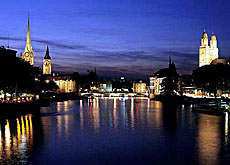Zurich faces uncertain future as financial hub

Zurich's future as a leading financial centre is looking precarious - the city has been buffeted by thousands of job cuts and is facing stiff competition from abroad.
On Monday, a survey of 105 European private banks said Switzerland’s private banking system was threatened by an industry slump.
The IBM Business Consulting survey said the traditional European “offshore” banking model – which hinges on banking secrecy – was dying.
Report author, Ian Woodhouse, estimates that between 55 and 60 per cent of overseas funds in Swiss banks come from the European Union – which is taking steadily cracking down on tax cheats.
“Clearly, Switzerland is most at risk because of its dependency on EU money,” Woodhouse said.
The threat to Switzerland’s banking industry has triggered much soul-searching within Zurich’s banking world.
On the one hand, critics say Zurich is doomed to become a financial backwater, hamstrung by high costs and a lack of innovation.
Others argue that the lakeside city has an unassailable global lead in key niche markets such as private banking, despite threats from competitors.
“When you say that the future of Zurich is in question, that’s true,” Arthur Bollinger, CEO of private bank Maerki Baumann & Co, told swissinfo.
“But if the Swiss and Zurchers were not under pressure, they would not do the repair jobs they have to do,” he added.
The comments underline the view that the city needs to rethink its place in the global financial market.
Secrecy
Traditionally, Zurich has profited handsomely from its reputation as a haven for private banking – where consistency, efficiency, and above all, discretion are the rule.
But EU demands on Switzerland to scrap banking secrecy have many wondering how long Swiss confidentially rules can hold out against the pressure.
JP Morgan Private Bank, the biggest private bank in the United States, has vowed to give the Swiss a run for their money on a level playing field.
“I always thought that Switzerland owned the word ‘secrecy’ in the same way that Volvo used to own the word ‘safety’ when it came to automobiles,” Maria Elena Lagomasino, the bank’s chief executive, told the Financial Times last week.
Outgrown
Add to that the fact that competition from big financial centres such as London, New York and Frankfurt has already hurt Zurich’s standing.
Over the past ten years, the city has been outgrown by many of its rivals.
Between 1995 and 2001, Zurich’s share of global stock market capitalisation fell 0.72 per cent. New York grew by five per cent, and London by 8.14 per cent.
Then there is unemployment. Of the 140,000-service sector jobs created in Zurich between 1985 and 2001, 10,000 have already been shed.
The Zurich-based business think-tank, First Tuesday Zurich, recently organised a forum among some of the city’s top business figures.
They tried to imagine what Zurich as a financial centre might look like ten years from now.
Ghost town
The scenarios they developed ranged from optimistic dreams of Zurich overtaking London and New York, to darker predictions of it becoming a financial ghost town.
Banker Arthur Bollinger said Zurich had no hope of overtaking the big centres, and should focus on its traditional strengths.
“The Swiss have to face the fact that financial centres such as London and New York are simply much larger and more diversified than Zurich.”
However, when it comes to private banking, Zurich still punches above its weight.
“There is a saying that the Swiss get up early, but wake up late,” Bollinger said. “This is true, but the Swiss are now waking up and cleaning up the field.
“In private banking, of which Zurich has the world’s largest market, we’ve become more efficient. This causes the unemployment, but we’ve learnt our lesson.”
Unique niche
Peter Taylor, a professor of geography from Loughborough University in Britain – who addressed the forum – said Zurich’s strength as a financial centre was that it did not try to replicate London or New York.
“It’s very important for cities to develop niches that they can develop,” Taylor told swissinfo.
Zurich is also connected to the world’s leading developing cities, such as Mexico and Mumbai.
“Zurich is well placed as a sort of gate-way linking the richest parts of the world to the poorer parts of the world,” he said.
“You can imagine a scenario where that unique niche for Zurich pays dividends in the next ten years.”
swissinfo, Jacob Greber in Zurich
Last year, Swiss banks managed assets worth SFr3.3 trillion ($2.52 trillion).
In 2000, Zurich generated 22 per cent of Switzerland’s national income.
Zurich and its environs are home to 250 banks.
The city also has the world’s third largest insurance market, behind London and Munich.
Financial services account for one in five jobs, and provide almost half of the city’s tax revenues.

In compliance with the JTI standards
More: SWI swissinfo.ch certified by the Journalism Trust Initiative











You can find an overview of ongoing debates with our journalists here . Please join us!
If you want to start a conversation about a topic raised in this article or want to report factual errors, email us at english@swissinfo.ch.